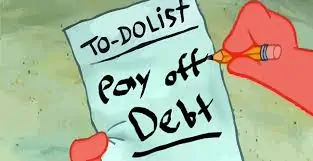Upgrade Your Lifestyle Without Giving In To Lifestyle Inflation
To those graduating from medical training programs this summer, graduating grad school, starting new jobs and entering true adulthood, CONGRATULATIONS!!! The light at the end of the tunnel is HERE. You have arrived! The world is your oyster. YOU NO LONGER HAVE TO STUDY (I hope).
In addition to calling the shots and doing things your way, your paycheck will increase exponentially. …YAYYYYYYYY!!!!

You will no longer be a poor trainee or student, you will have disposable income and you can start saving! You can finally start living the life you’ve always imagined!
Then reality hits…
…for instance, higher income taxes and the jump in your student loan payments (can I get a collective EW). In addition, if you’ve gotten married and have moved to a bigger place, or are like me and moved to a nice city and insisted on living downtown with a great view, then your living expenses will also jump.
When I started my job, and all the expenses hit, I realized that the increase in my paycheck was getting eaten up very quickly. Then the horrific thought:
“WHAT ABOUT MY UPGRADES???”
I think many of us on this path in life imagines entering the professional real world and finally upgrading their lifestyle to one they’ve always imagined. This could mean a nice home, nice car, nicer clothes, or fancy vacations, etc. And why not? We work so hard and long to get here, and we all deserve to enjoy our spoils.
Personally, when I started my real job, I had imagined purchasing a place of my own. To me paying rent is the equivalent of throwing your money away. However, the reality of owning property….the down payment, the closing costs, the mortgage….while looking for condos I was also horrified to see the cost of homeowners association fees and let’s not forget about property insurance.
HUH? In addition to higher taxes and loans, I would have to deal with all THAT?
No thank you.
(I did finally make the leap to buying a house, however that came much later)
So If Not Big Life Purchases, How Can You Upgrade?
For me, I shifted my focus on a different kind of lifestyle upgrade, one that I knew would satisfy my need to treat myself – travel. I have friends who went down a completely different pathway, including ones that looooove their fancy handbags, another that throws all her money into hiring help so that she never has to do housework again, and yet another who dumps all of her extra monies into the stock market and plays with it there.
What You Should Focus On
There is no right answer to upgrading your lifestyle, should you want to. However, I suggest that you focus in on the things in life that bring you the most joy. How we spend our money matters; if you’re purchasing high end products, or spending on life experiences, whatever it is, it should reflect YOU, and your values. Anything outside of that is just unsatifsying fluff that will never fulfill you and suck you into the never ending cycle of lifestyle inflation.
What is Lifestyle Inflation?
Lifestyle inflation, also called lifestyle creep, is this concept of upgrading and “improving” your life as your paycheck increases. I’ve seen this take effect where people purchase items in a way that reflects what others are doing, or what your colleagues are doing. I think it also gets people wrapped up by selling this idea that you need to live your life a certain way by having certain things or doing certain things, and only then will you fit in with society’s measure of success and happiness.
Why it never works:
It’s like keeping up with the Jones’, however, it never works out because everyone starts out at a different financial level, has different personal finance goals, and has different life responsibilities to deal with. Our stories are all different, so how can it make sense that our spending patterns are the same, or should be the same?
How you can avoid Lifestyle Inflation
This is difficult. Society tells us that by making more we should be spending more. However, I encourage you to consider these things FIRST before upgrading, or inflating your lifestyle.
Consider your debts
This is a huge burden on finances, especially student loans which are never forgiven, and credit card debt, which is super expensive. While setting a monthly payment and forgetting about it is a great way to make your payments on time, and guarantee that you pay them, we should also all be considering how much we are actually paying overtime.
You will always pay back MORE than you borrowed over the life of a loan, and how much extra you pay depends on your interest rate. That’s extra money that you could keep, invest, or use to make some life purchases that you want.
In addition, many large lifestyle upgrades, like a home or buying a new car, require that you take on more debt. While it may be easier to get as many loans as you want as a high-income earner, it may not be the wisest or more financially sound decision.
The last thing you want is to have this great lifestyle on the outside and be drowning in debt, or living paycheck to paycheck and struggling to make ends meet on the inside. Also, to clarify, I’m not saying that you shouldn’t buy a home or a new car, I’m asking that you wait until you are truly able to afford it, and don’t overwhelm yourself with more debt than necessary. For instance, wait until you have 20% down payment on a home, versus putting down less and giving yourself higher monthly payments. Alternatively, an expensive car might make you feel like “you’ve arrived in life” but that same car might require pricier mechanics or upkeep, more expensive gas, and just be harder to maintain.
Side note: the more debt you have, the longer you will likely have to work in order to pay it off to work toward financial independence, or before you retire.
Pay yourself first
I mean pay into your retirement and investment and savings accounts. Save first, spend later.
I have a friend who is so focused on repaying student loans (yay) that she isn’t investing in her retirement accounts AT ALL (nearly gave me a heart attack when I found out).
Retirement may seem like a faraway thing, especially if you’re just starting to work, however, the amount we have by the time we are of that age (or whatever age you have in accordance with your longterm financial goals) is dependent entirely on WHEN you start investing. The amount doesn’t matter as much; what matters is that you start early and keep doing it.
When I lived in New York City during my medical training, I paid maybe 100 dollars per month into investing and retiring, combined. It’s not much, but it was something and I’m seeing the benefits of that little bit today.
The magic of compounded interest only works over long periods of time. So PLEASE put SOMETHING away into these accounts (plus, guys, think of the tax savings!). The money is still yours; it’s just for future you.
The same goes with investing and saving. Invest regularly in the stock market, or into assets you believe in. Save up enough for an emergency fund worth 6 months of expenses. These measures are all meant to help you gain wealth and prevent you from accumulating more debt.
Don’t spend on things that don’t matter
Everyone has different priorities. Yours may not line up with your neighbors or colleagues, and that’s ok! Spend on things that make you and your family happy, regardless of what anyone else is doing.
Comparison is a happiness killer, and constantly trying to keep up with someone else will always set you up to fail. Many people have more debt than they admit, many just make more, and some have family wealth that you can’t compete with.
So, as I mentioned above, don’t spend money on things that don’t matter to you. Shift your focus to things that do matter, that help you live a life that feels fulfilled.
Look for the best deals
I think one big problem with lifestyle inflation is the amount of money spent. Do you want to upgrade your car? Fine, but why pay full price? Why not look for gently used? Or purchase an older model? Both of the latter options can save you a nice sum of money.
Unfortunately, I think that lifestyle inflation is also tied to not only having the best, but also the newest item on the block. While you may earn some street cred for being the first to buy the newest model of your favorite electronics, that title won’t last long.
So then why spend so much on a temporary gain?
Again, I’m not saying you can’t have nice fancy things, but maybe just take a minute and see if you can find a better deal. Because at the end of the day, the products are really all the same, and you’ll likely only use them for a certain period of time anyway before eyeballing something else…in which case, why not try and save? Plus, don’t you hate overpaying for something when you don’t have to???
Don’t purchase what you can’t afford
This goes hand in hand with the above…if you don’t have the money for it, don’t buy it. Don’t buy things on credit unless you can make the full payment at the end of the month. Wait to buy a home until you have the full down payment (on that note, also don’t buy a bigger house than you need!). Have money limits in mind for the lifestyle upgrades you’re looking for.
There is no physical item worth going into crazy debt for.
If you spend all your money on travel..
If you’re like me and prefer to spend your funds on globe trotting, then great! But still make sure that you don’t allow for lifestyle inflation to creep in.
How can you be experiencing lifestyle inflation during your travels?
- Staying a fancy, over the top hotels
- Buying fancy souvenirs that you will never use or display (and/or not haggling down the price)
- Flying first or business class everywhere (there’s a way to calculate if this is actually worth it – see below)
- Taking expensive taxis (i.e. not paying attention to how much you’re paying for them)
- Only eating at expensive restaurants
Travel requires a little bit of planning and budgeting. You can still have a great comfortable vacation without spending a lot.
Calculating Ticket Prices
For fancy airline tickets, do this: find the lowest roundtrip business and first-class ticket prices. Divide that number by the number of hours total spent in the air to get to your destination. That will be the cost per hour. If you don’t make more than that per hour, you cannot afford that ticket.
For instance, say you find a business class ticket from LA to Frankfurt for 2400. That’s approximately a 12-14 hour trip one way, so let’s say a 24 hours total round trip. That’s about $100 per hour to fly fancy. If you make more than that per hour, that’s a ticket that you can afford. If not, don’t do it.
Overall
Wanting to upgrade your lifestyle is what many of us naturally want to do as we move up in our careers and make more. And you should do it; we all deserve to treat ourselves and spend on things that make us happy, or make our lives a bit easier. However, don’t get caught up in lifestyle inflation that keeps you in a cycle of buying and buying more because you think you have to, or need to.
Be intentional with your saving and spending, and make gradual changes as you look to upgrade. Often times what sounds like a great idea in our heads, turns out to be not so hot in real life.
Be practical—for the expenses you have to fulfill
Be impractical—you can still have fun with your upgrade
Be true to yourself—you’ve made it! Its your time to shine 🙂
What steps have you taken towards avoiding lifestyle inflation?







